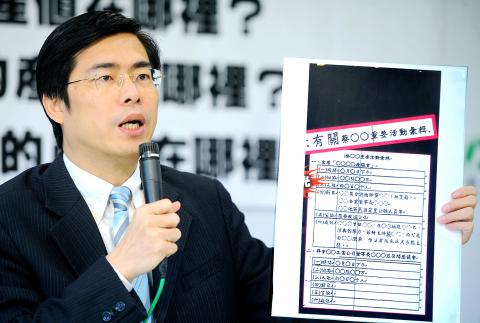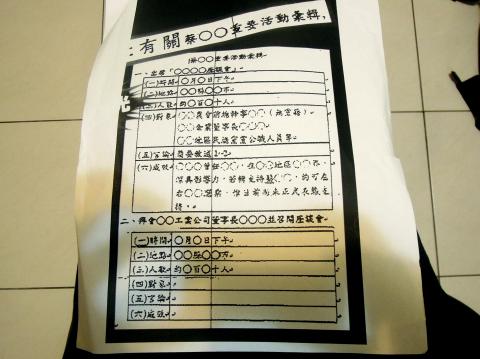The Democratic Progressive Party (DPP) yesterday condemned the intelligence authorities after allegations that they had been monitoring the party’s presidential candidate, Tsai Ing-wen (蔡英文), saying President Ma Ying-jeou (馬英九) should offer a clear explanation.
The Chinese-language Next Magazine yesterday reported that National Security Council (NSC) Secretary-General Hu Wei-chen (胡為真) had acted beyond his authority when he allegedly asked the Ministry of Justice’s Investigation Bureau to monitor Tsai in May.
Since Hu directly reports to Ma, who is seeking re-election as the Chinese Nationalist Party (KMT) candidate, Ma should explain whether he was aware of the illegal practice, Tsai said at a campaign stop in Kinmen.

Photo: Wang Min-wei, Taipei Times
“The President of the [Republic of China] ROC exploited government agencies to collect information to benefit his election campaign ... He is apparently capitalizing on the state apparatus for his own benefit and will have to be held accountable,” Tsai said.
At a press conference in Taipei, DPP spokesperson Chen Chi-mai (陳其邁) described the alleged practice as “Taiwan’s Watergate scandal,” as a president who is seeking re-election was suspected of abusing his power and ordering the intelligence authorities to monitor his opponents to benefit his election campaign.
According to the Next Magazine report, Weng Shih-tsan (翁詩燦), director of the NSC’s Secretariat, attended an intelligence meeting organized by the Investigation Bureau last week and took away information related to the presidential election, before submitting the information to Ma via Hu.

Photo: Lin Shu-hui, Taipei Times
The magazine’s report named 28 senior agents at the bureau, who it said were given the task of monitoring Tsai and submitting weekly reports on the times, locations and the attendees at Tsai’s campaign events.
The magazine said agents also made evaluations on the influence of local politicians or businesspeople who met with Tsai — KMT members and non-partisan representatives in particular — and predicted how many votes were at stake if they offered their support to Tsai.
It also cited an unidentified high-ranking official at the National Security Bureau (NSB) as saying that the NSC and Hu had ignored the intelligence system’s chain of command.
In response to the report, the NSC said that while it did send Weng to the meeting, he did not take any information away and no information had been submitted to Hu and Ma.
The NSB said in a press release that the NSC did not breach the chain of command.
The Investigation Bureau also denied the report. It said in a press release that it is one of the agencies responsible for the security of the presidential and vice presidential candidates, so naturally it knows about the candidates’ campaign activities. However, it said it does not get involved in the election, adding that while it analyzes and responds to the security situation, it does not offer the Presidential Office or the NSC candidates’ campaign information.
At a separate press conference, the DPP caucus criticized the alleged illegal monitoring.
On Dec. 23, 2008, Ma urged the Investigation Bureau’s agents to pledge loyalty to the country, the Constitution and the people, rather than the president or their superiors, DPP Legislator Lin Shu-fen (林淑芬) said.
Ma also said during a presentation last week that he would withdraw from the election if he “had resorted to the state apparatus for political oppression of his opponents,” Lin added.
Lin said she wondered whether Ma dared to make the same pledge again now that it was clear that the NSC, which is in charge of formulation and coordination of national security and defense policy, has become an agency that collects domestic election information.
When approached by reporters during a visit to a market in Greater Taichung, Ma said he had no knowledge about Tsai’s campaign schedule and he simply said “no” when asked whether he had instructed the NSC to collect information on Tsai.
Additional reporting by Rich Chang and Mo Yan-chih

DAREDEVIL: Honnold said it had always been a dream of his to climb Taipei 101, while a Netflix producer said the skyscraper was ‘a real icon of this country’ US climber Alex Honnold yesterday took on Taiwan’s tallest building, becoming the first person to scale Taipei 101 without a rope, harness or safety net. Hundreds of spectators gathered at the base of the 101-story skyscraper to watch Honnold, 40, embark on his daredevil feat, which was also broadcast live on Netflix. Dressed in a red T-shirt and yellow custom-made climbing shoes, Honnold swiftly moved up the southeast face of the glass and steel building. At one point, he stepped onto a platform midway up to wave down at fans and onlookers who were taking photos. People watching from inside

A Vietnamese migrant worker yesterday won NT$12 million (US$379,627) on a Lunar New Year scratch card in Kaohsiung as part of Taiwan Lottery Co’s (台灣彩券) “NT$12 Million Grand Fortune” (1200萬大吉利) game. The man was the first top-prize winner of the new game launched on Jan. 6 to mark the Lunar New Year. Three Vietnamese migrant workers visited a Taiwan Lottery shop on Xinyue Street in Kaohsiung’s Gangshan District (崗山), a store representative said. The player bought multiple tickets and, after winning nothing, held the final lottery ticket in one hand and rubbed the store’s statue of the Maitreya Buddha’s belly with the other,

‘NATO-PLUS’: ‘Our strategic partners in the Indo-Pacific are facing increasing aggression by the Chinese Communist Party,’ US Representative Rob Wittman said The US House of Representatives on Monday released its version of the Consolidated Appropriations Act, which includes US$1.15 billion to support security cooperation with Taiwan. The omnibus act, covering US$1.2 trillion of spending, allocates US$1 billion for the Taiwan Security Cooperation Initiative, as well as US$150 million for the replacement of defense articles and reimbursement of defense services provided to Taiwan. The fund allocations were based on the US National Defense Authorization Act for fiscal 2026 that was passed by the US Congress last month and authorized up to US$1 billion to the US Defense Security Cooperation Agency in support of the

‘COMMITTED TO DETERRENCE’: Washington would stand by its allies, but it can only help as much as countries help themselves, Raymond Greene said The US is committed to deterrence in the first island chain, but it should not bear the burden alone, as “freedom is not free,” American Institute in Taiwan Director Raymond Greene said in a speech at the Institute for National Defense and Security Research’s “Strengthening Resilience: Defense as the Engine of Development” seminar in Taipei yesterday. In the speech, titled “Investing Together and a Secure and Prosperous Future,” Greene highlighted the contributions of US President Donald Trump’s administration to Taiwan’s defense efforts, including the establishment of supply chains for drones and autonomous systems, offers of security assistance and the expansion of